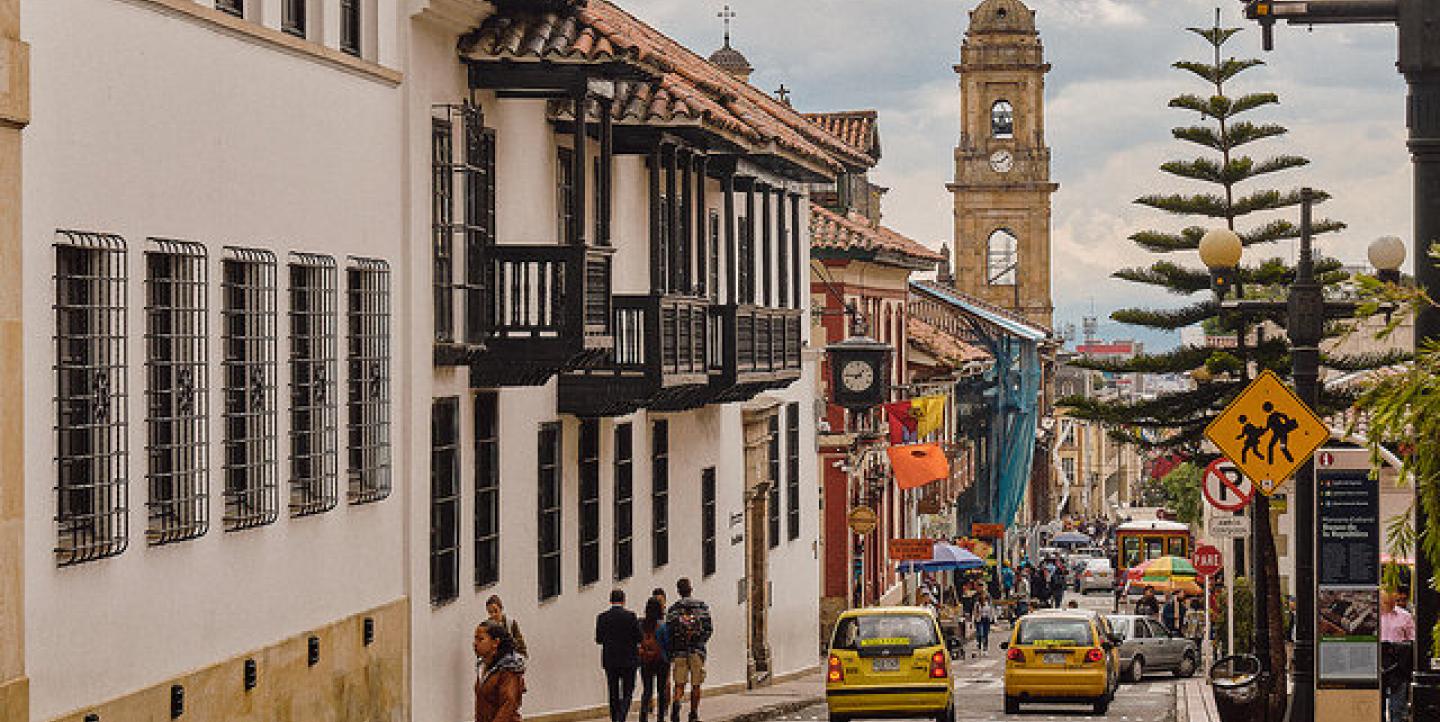"Freelancing abroad" is an IJNet series that explores the lives of freelance journalists who have relocated abroad. Also check out part one about Pesha Magid's move to Istanbul.
Laura Dixon arrived in Bogotá, Colombia in the fall of 2015. The British journalist was interested in Latin America; she had studied the region in university and had previously worked as a journalist in Chile.
For years, she worked as a journalist in London at The Financial Times and the Times of London, but was really interested in being a foreign correspondent. Given the financial struggle facing most media outlets, she realized her publication would not send her abroad. She decided to become a freelancer to achieve her dream.
She and her husband looked for a Latin American country where they both could find jobs and eventually found their new home in Bogotá, arriving with their three-month-old baby.
“I had a slow transition getting used to the city,” she said.
Seven months after their arrival, Dixon started working full time again. At the time, the peace deal between the Colombian government and the FARC — a revolutionary paramilitary group — was in its final stages after decades of conflict. This context made it easier for Dixon to sell her stories to European media, with whom she already had connections.
“People were giving each other work sometimes when they couldn’t do it,” she said. “Helping each other with sources and contacts rather than being cutthroat.”
However, she has seen more new journalists arrive since the peace deal and thinks it might be becoming more competitive and difficult for newcomers.
“My suspicion is that […] it’s going to be harder and harder to get pieces in, especially in the European media,” she said, adding that the biggest challenge in the coming months and years will be to keep editors interested.
Since the peace deal was signed and media attention dropped, selling stories has become harder. Dixon and two other journalists got a grant from the Pulitzer Center on Crisis Reporting to fund a series on post-conflict stories, which are much harder to sell.
“In the runup to the peace deal being signed and in the first months after, I was really busy on the news front,” she said. “That definitely dropped off very quickly and now there hasn’t been much interest in the post-conflict stories.”
While Dixon’s professional connections are mostly in Europe, she said she’s found that North American publications are more interested in stories coming from Colombia.
When she first arrived, Dixon got some help settling in from journalists who had been in the region longer. A journalist she knows organizes monthly meetups for foreign journalists.
Dixon said she thinks Bogotá is an affordable city for freelance journalists working for American or European media that pay in euros or dollars, but notes that some expenses, such as home internet, can be particularly expensive.
She warned of ongoing security risks, especially in some rural areas — like near the Venezuelan border, where two Dutch journalists were kidnapped last year.
“[Especially] as a foreigner, you just need to be very aware,” she said.
Bogotá is a safe city, but there are some areas with high crime rates that she recommends avoiding at night or by yourself. The Knight Center for Journalism in the Americas and the International Women’s Media Foundation are currently offering a free online course in Spanish about risks and security in Latin America.
Dixon has found people to be quite open sharing their opinions but she said that for some stories — like on social leaders — it’s important to be careful about your sources’ safety. Hundreds of community leaders have been killed in 2017.
One of the challenges she has faced is finding contact information for government spokespeople on official websites. She has had to find specific names and call general phone numbers to get in touch with public relations officers.
“You have to know the person’s name and ideally, you want to have WhatsApp,” she said.
Dixon said the app is widely used in Colombia and that she often receives press invitations and exchanges on the platform — more so than through emails.
She also said press conferences, even from international organizations, often start late — sometimes two hours after the advertised time.
Since she has to sometimes file stories based on British time, she needs to have them finished by 1:00 p.m. Colombian time and finds it challenging to talk to sources in the morning.
“That’s when having everyone’s mobile numbers comes in handy,” she said.
Dixon recommended that journalists thinking about moving to Bogotá consider undergoing a Hostile Environment Training, as some editors require freelance journalists to have this training before sending them on assignment. She got hers through the International Women’s Media Foundation’s HEFAT training program.
She also said it’s very important to speak Spanish, since many people in Colombia don’t speak English, especially outside the capital. There are many ways to practice the language online through free platforms such as Duolingo and Busuu or paid ones like Rosetta Stone. Instituto Cervantes, a Spanish public institution with 65 centers around the world, also teaches Spanish. Mundo Lingo is an organization that hosts language exchange events in several cities around the world.
Main image CC-licensed by Flickr via Pedro Szekely.

